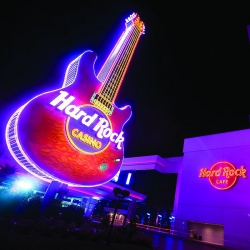Hard Rock International still plans on applying for a North Jersey casino license, despite buying the Trump Taj Mahal in New Jersey earlier this week. Hard Rock International, owned by the Seminole Tribe of Florida, sought a partnership for a Meadowlands casino prior to a November 8 referendum defeat to approve such casinos.
In an interview this week with the Associated Press, Hard Rock International CEO Jim Allen said his company would like to build a $1 billion-or-more casino in the Meadowlands, Jersey City, or Newark. The next time a North Jersey casino vote could appear on a ballot would be in November 2018.
Jim Allen, a native of New Jersey, said in the AP interview, “We are 100 percent still on board to do that project at the Meadowlands.”
Mr. Allen’s remarks came a day after his company bought the Trump Taj Mahal and announced it would invest $300 million to renovate and rebrand the casino, once termed the “Eighth Wonder of the World” by Donald Trump. When Trump Taj Mahal reopens, it will be renamed the Hard Rock Atlantic City.
The original plan was to partner with Jeff Gural of Tioga Downs fame to place a hotel and casino on the grounds of the Meadowlands Racetrack. Gural holds a lease for the Meadowlands track, so the two sides would have built a billion-dollar resort about 125 miles from Atlantic City.
Stephen Sweeney on North Jersey Expansion
Stephen Sweeney, the New Jersey State Senate president, said he does not see a new initiative appearing on the 2018 ballot, because of the lopsided nature of the last bill’s defeat. After Gural and Paul Fireman realized the bill was going to lose and withdrew advertisement in the last month of the campaign, the bill lost by a record 78% to 22% margin.
Ralph Caputo, a New Jersey representative, disagrees with Sen. Sweeney’s opinion. He said that lawmakers would need to take a wait-and-see approach until 2018. Some political analysts felt the 2016 North Jersey casino initiative suffered from a lack of clarity, because the voters in the northern half of the state did not know where the casino would be built. Those people believe voters might have supported gaming venues which would bring jobs, entertainment, and an influx of cash in the area, though they did not want one built in their community.
Why the North Jersey Casino Referendum Lost
If that is the case, then a new proposal with more specific parameters might receive a great deal more support. Also, some believed the previous referendum was hamstrung by the limited nature of the application process. Only license holders of New Jersey casino or racetrack licenses could apply in the first phase of bidding, with outside operators only allowed to bid if two billion-dollar offers were fielded by Atlantic City casino owners.
That limitation mean that big casino companies like Las Vegas Sands Corporation and Genting Group did not get behind the proposal. Had those operators not been barred, they might have invested significant money into advertising and political action groups for the referendum.
Hard Rock International’s Plans
Hard Rock International might be planning for the next round of bidding, either way. If a new proposal required bidders to have a New Jersey license, then Hard Rock will be in the game. If a theoretical new licensing plan did not contain such a provision, the Seminoles would have won goodwill among some political, business, and union leaders in New Jersey.
As Jeff Gural said to NJ.com, “I am sure the politicians and local leaders are appreciative that Hard Rock stepped up to buy (the Taj) and reopen it as opposed to leaving it closed or tearing it down.”
Trump Taj Mahal Sale Winners
An article in The Ledger this week discussed the winners and the losers in the sale of the Trump Taj Mahal. The Ledgers decided Hard Rock International was the main winner, since they dealt themselves into a market the Seminoles long had wanted to enter. Most industry experts believe the Hard Rock brand should be an asset to Atlantic City’s recovery, due to the company’s resources and the jobs another casino will bring to the troubled city.
The Local 54 of the UNITE-Here workers union also was dubbed a winner. The local chapter of the union, which represented about 1000 of the 3000 employees of the old Trump Taj Mahal, stood up to Carl Icahn for the sake of their health and pension benefits. The Ledger assumes that Bob McDevitt will be able to negotiate a better deal with the Seminoles than they would have with the billionaire investor, who back in the 1980s often was referred to as a corporate raider.
Trump Taj Mahal Sale Losers
Speaking of Carl Icahn, the Ledger deems him to be a loser in the deal. This would be hard to argue, because Mr. Icahn took a big loss on his purchase of the iconic Atlantic City casino. Such losses are few and far between for Carl Icahn, who also owns the Tropicana Casino in Atlantic City and is considered to have led a successful turnaround of that resort. The New York City-based activist investor has built vast wealth over the last several decades, investing in a who’s who of American corporations.
The Ledger suggested that the other 7 operating casinos in Atlantic City are losers in the deal, because they now have more competition. The AC casinos had begun to reap the windfall of having fewer competitors, after 5 of the 12 casinos in the Atlantic City market closed.

